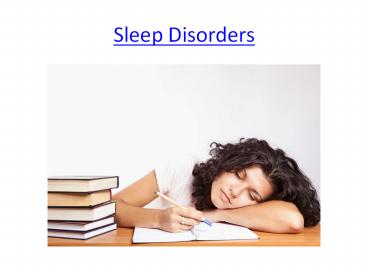Sleep Disorders - PowerPoint PPT Presentation
Title:
Sleep Disorders
Description:
Dutchess Neurology, PLLC provides patients throughout Dutchess County, NY the latest diagnosis, treatment and ongoing care for multiple sclerosis, migraines and other types of headache, Alzheimer’s disease and memory loss problems, sleep disorders and other neurological conditions. – PowerPoint PPT presentation
Number of Views:26
Title: Sleep Disorders
1
Sleep Disorders
2
Sleep disturbances and sleep disorders are
commonly associated with neurological diseases,
and neurological impairments of sleep reveal much
about the brain circuitry involved in sleep
regulation. Many neurological disorders are now
recognized to cause disruptions of sleep.
3
Sleep is a powerful modulator of epilepsy, with
some epilepsy syndromes occurring exclusively or
predominantly during sleep. These include benign
childhood epilepsy with centrotemporal spikes,
autosomal dominant nocturnal frontal lobe
epilepsy, and continuous spike-wave activity
during sleep. Sleep deprivation has also been
described as a risk factor for epileptic
seizures, although alcohol use and work-related
stress are confounding factors.
4
Sleep disorders can also occur as a consequence
of treating neurological disorders. For example,
pathological sleepiness may occur during
treatment of Parkinsons disease and other
movement disorders with dopamine-related drugs.
In addition, many drugs used to treat
neurological disorders can cause excessive
sleepiness or wakefulness.
5
Dutchess Neurology, PLLC provides patients
throughout Dutchess County, NY the latest
diagnosis, treatment and ongoing care for
multiple sclerosis, migraines and other types of
headache, Alzheimers disease and memory loss
problems, sleep disorders and other neurological
conditions.
Loren E. Rosenthal, M.D. CPE has 38 years
experience treating a variety of neurological
disorders. In addition, he is Director of the
Sleep Center at the Mid Hudson Regional Hospital
of the Westchester Medical Center. We look at a
range of neurological symptoms from headaches
to pain to altered vision, from sensory changes
to balance and coordination to weakness in a
comprehensive way.































